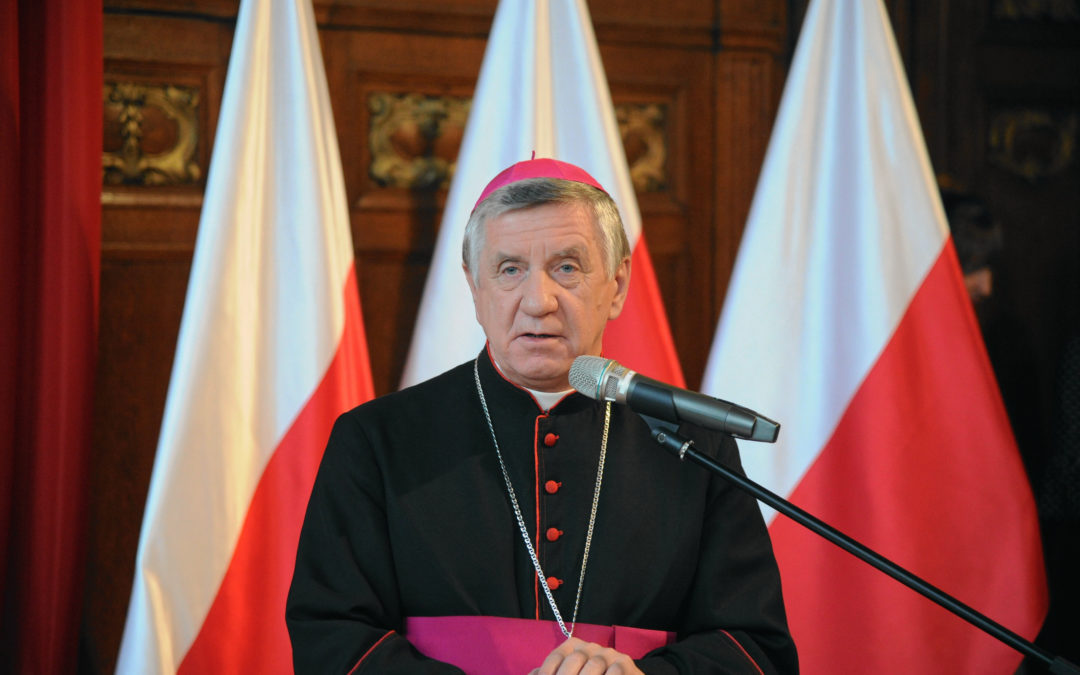A Polish archbishop has reassured churchgoers that “Christ does not spread germs” and that they can therefore continue practising their faith as usual, including using holy water and taking communion.
Other senior church figures have, however, urged the faithful to change their habits in response to the coronavirus epidemic, and many Catholics in Poland have been using other methods to fulfil their worship obligations.
In a letter to parishioners, Archbishop Andrzej Dzięga, the metropolitan bishop of Szczecin-Kamień diocese, used the famous words of Pope John Paul II, “Do not be afraid”, to tell the faithful not to fear taking water from the font, Onet reports.
“Satan is powerless in the face of this clear and unambiguous human testimony of faith,” the archbishop wrote. “There is a reason why it is said that somebody is afraid like the devil of holy water…Do not be afraid to reach with faith for the holy water…Do not be afraid of the church.”
The archbishop also noted that the faithful had the right to request communion “in the hand”, rather than directly in the mouth, but asked that they refrain from doing so and continuing receiving it on the tongue as is more usual.
“Before our eyes, a tiny virus in a crown is causing even the greats of this world to fall into terror, those who just a moment ago were ready to fight with God and His Laws. Yet God is above the virus. Christ does not spread germs or viruses. Christ hands our purity and Life, and restores health,” he wrote.
The church has given out mixed messages since the beginning of the coronavirus crisis, and attracted criticism for downplaying the seriousness of the epidemic as well as for its refusal to cancel masses. Whereas churches have closed in Italy, and the Catholic church in England has announced that it is preparing to suspend services, its Polish counterpart decided to increase the number of services in order to reduce average attendance at each.
Archbishop Stanisław Gądecki, the president of the Polish Episcopal Conference, said that “churches are something like hospitals for the soul”, an image previously used by Pope Francis. His words were echoed by Jarosław Gowin, a deputy prime minister, who supported the episcopate’s decision to keep churches open.
Meanwhile, the Archbishop of Częstochowa described the coronavirus as just “another type of flu”, declaring that wars and “gender ideology” are greater threats to civilisation. The Salesian Order in Wrocław apologised after a priest was reported as saying during mass that “coronavirus is punishment for the sins of abortion and homosexuality” and “only prayer can protect people”, not masks or sanitisers.
Yet as Sunday approached, parts of the church changed their approach. Some Catholic orders, including the Dominicans, closed churches and cancelled masses, saying they could not comply with the ban on public gatherings exceeding 50 people introduced by the government on Friday. The basilica in Bydgoszcz started providing holy water in individual bottles as well as a hand-sanitising spray.
On Saturday, Archbishop Gądecki himself urged the faithful to make use of a dispensation to excuse them attending Sunday Mass, suggesting that they should take the opportunity to participate in services on television and online, reported Onet.
Archbishop Wojciech Polak, the primate of Poland, also said that habits needed to change. Appearing on TVN, he said, “It is about health and safety. It is about us not infecting each other, breaking this epidemiological chain that exists.”
State television last night showed that many parishioners had indeed stayed away from churches, broadcasting images of empty pews and families gathering around televisions to watch mass from home, as well as one priest driving through the streets performing a mobile ceremony.
#Wiadomości | Wierni w całej Polsce dziś zamiast w kościołach modlili się przede wszystkim we własnych domach, także oglądając transmisje nabożeństw w Telewizji Polskiej. Do skorzystania z dyspensy na niedzielne msze zachęcali biskupi. pic.twitter.com/auMvD2G11w
— WiadomościTVP (@WiadomosciTVP) March 15, 2020
Archbishop Dzięga has faced criticism for his words. Piotr Sikora of Tygodnik Powszechny, a Catholic weekly, wrote that it was “very strange and sad” that he was citing a theology “closer to ancient heresies than to Catholic orthodoxy”, and warned of the potential “catastrophic consequences for society”.
“Many people, deceived by the bishop’s arguments…could take actions that are dangerous not only for their own health and life – but also place the health and lives of their families at risk,” Sikora wrote.
Presidential candidate Szymon Hołownia, a devout Catholic, wrote on Twitter that the letter “is not just the height of stupidity and recklessness”, but “encouragement to ignore hygiene rules during an epidemic. May this stupidity and recklessness and ‘mystical epidemiology’ not cost somebody’s health or life.”
List abpa Dzięgi jest nie tylko szczytem głupoty i niefrasobliwości. To zachęta do nieprzestrzegania zasad higieny w czasie trwającej epidemii. Oby ta głupota i niefrasobliwość, ta „epidemiologia mistyczna” nie kosztowała czyjegoś zdrowia, albo życia. #ZostańmyWDomu #Hołownia2020 https://t.co/sjscEup2tS
— Szymon Hołownia Oficjalny (@szymon_holownia) March 15, 2020
Main image credit: Krzysztof Hadrian/Agencja Gazeta

Ben Koschalka is a translator, lecturer, and senior editor at Notes from Poland. Originally from Britain, he has lived in Kraków since 2005.




















